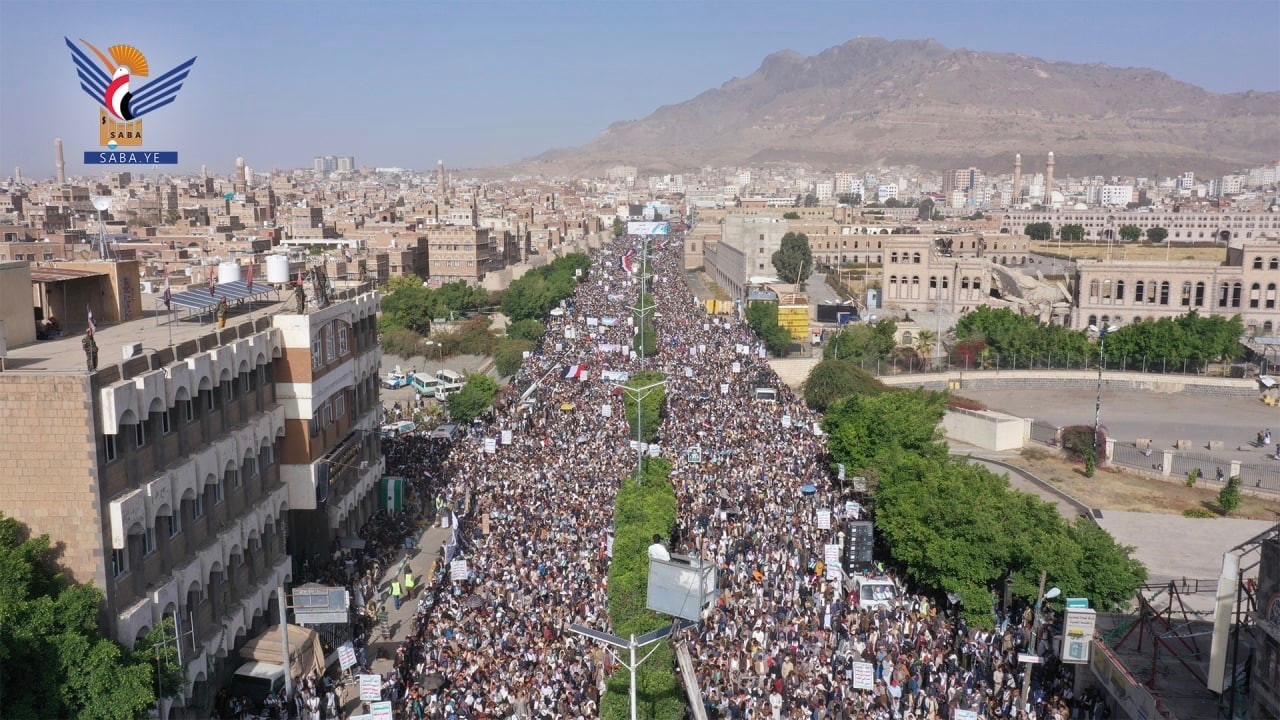The Saudi Arabia-led war in Yemen has officially entered its eight year. To commemorate their resolve to defeat the Saudi-led invasion, thousands of Yemenis took to the streets of major cities including capital Sanaa on Saturday, March 26. The day is marked as the National Day of Steadfastness when in 2015, the Saudi-led coalition began its aggression.
Protesters on Saturday carried posters of Hussain Badreddin and Abdel Malek, leaders of the Ansar Allah (Houthi) movement which is leading the fight against the external coalition. The protests were addressed by regional governors and leaders of the movement. They asked for greater resolve to defeat the US and Israel, who they claimed are the real instigators of the war and backers of the enemies of the Yemeni people.
The speakers also highlighted the hardships caused by the war, particularly by the thousands of airstrikes carried out by the coalition forces killing hundreds of innocent civilians, and destroying homes and other infrastructure. In their addresses, Badreddin and Malek underlined the criminality of the comprehensive seven-year-long air, sea, and land blockade on Yemen imposed by Saudi Arabia and its allies, which has prevented crucial medical and food supplies from reaching the people. This has pushed millions to the verge of starvation and death due to lack of proper medical care.
Saudi attempt to create regional hegemony
The war in Yemen has been waged by Saudi Arabia, the UAE, and other allies since 2015 with the objective of creating regional hegemony. The people of Yemen have been punished for revolting against the inefficient and corrupt administration led by Abdrabbuh Mansur Hadi, a Saudi ally. Saudi Arabia and its allies have been actively backed by the US, the UK, and other western countries. They all still recognize Hadi as the Yemeni president and want to reinstate him in power despite his unpopularity. Hadi, who fled Yemen after the Houthis took control over capital Sanaa, now lives in Riyadh in exile. He is seen as a valuable ally who can deliver Yemen and its resources to serve the US and its regional allies.
Both Saudi Arabia and the US have tried to justify their war in Yemen by giving it a regional angle, calling the Houthis an Iranian proxy. The US and the UK, which have benefited from the war by selling weapons worth billions of dollars to Saudi Arabia and the UAE, have accused Iran of supplying weapons to the Houthis. Both Iran and the Houthis have accepted their common cause of ideological opposition to the US and Israeli presence in the region, but have rejected claims of an alliance between them. Nevertheless, the media in the West continues calling the war in Yemen a “proxy war” without any substantial basis.
The UN, apart from maintaining humanitarian assistance in the war-affected regions, has failed to pressure the Saudi-led coalition to end its war in Yemen. Due to the US support, the UN has also failed to hold Saudi Arabia accountable for its air strikes in civilian areas and other human rights violations, despite UN investigators providing enough proof for the same. Under pressure from the coalition and their allies, the UN was forced to disband the team of investigators in Yemen last year. This has given Saudi Arabia and its allies a free hand to carry out indiscriminate attacks killing more civilians than ever before.
Yemeni resistance
Despite their apparent weakness vis-a-vis the coalition alliance of over a dozen countries, the Yemeni people led by the Houthis have been able to inflict substantial costs on the aggressors. Last week, Houthi-fired drones were able to hit Saudi oil refineries in Jeddah, affecting oil production. This was the third major attack on Saudi facilities since the 2019 attack on its Aramco facility which disrupted oil production for over a week. Similarly, the Houthis were able to penetrate the UAE’s defenses in January and attack an oil storage facility and an airport in Abu Dhabi in a rare operation.
The Houthis have also been able to withstand the combined armed forces of Hadi loyalists and the Saudi-led coalition on the ground. They control the majority of the densely populated regions in the north and west and have been able to repel Saudi attempts to attack from across its border in the north.
The resistance has forced Saudi Arabia to come to the negotiation table on various occasions. However, all talks have failed to bring any decisive agreement due to Saudi insistence on Hadi’s reinstatement. Meanwhile, the resistance has also caused rifts in the Saudi-led coalition with some countries withdrawing from it, like Sudan in 2019. The Southern Transitional Council (STF) which has been backed by the UAE, Saudi Arabia’s closest ally in the coalition, has revolted against the Hadi-led forces on several occasions causing serious infightings.





